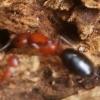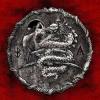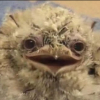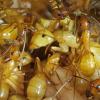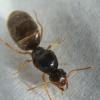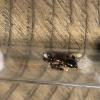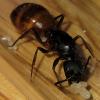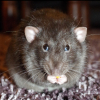Howdy y'all. Made a post about finding a colony and my attempt at making a formicarium for them in the general ant keeping forum. Thought I'd just say hi and post about my start so far.
Found / rescued a Camponotus sp. (probably Camponotus decipiens) from a log in our burn pile here in Texas, USA. The log had a queen, about 70 workers, some being majors, and probably at least twice as many brood numbers.
Really, really enjoying taking care of them and observing them. I have made a custom wooden formicarium that I hope will last a few years since they like it so dry in their formicarium. I'll have another made before this one molds or becomes dirty. They have been chowing down on crickets, spiders, and termites and gulping down honey. Most of them have huge gasters now. The queen has been laying eggs, adding to the huge brood that was in originally in the log.
It was a real rough start, getting them out of the log, corralling half of the workers and brood when they decided to move them into a rusted out lamp on the porch. Got those guys out of there and used some petroleum jelly to keep them in the aquarium till I had the formicarium made up. My first formicarium was too spacious and they moved most everyone inside a humidity meter sitting in the aquarium after they had already moved into the formicarium. That was hilarious but annoying. Amazing they got everyone crammed in there. I got a proper sized formicarium carved up and things have been going really great ever since.
Pretty sure some of the pupae and larva died in the chaos of the lamp fiasco and other moves though; they ate a few larva and pupae and a few pupae look rather shriveled now. Most larva have been fattened up now and even had one pupa hatch into a minor worker. Another pupa hatched (eclosed?) and that minor worker was weak, would not move, and was eaten. Brutal society these ants have. Very metal. I think those original pupae simply became dehydrated in the initial chaos and moving. I hope most of them hatch just fine, but man there is a lot of brood so while not a great start I don't think it will be a real set back for them, especially now they are eating everything in sight and being very attentive to the brood.
I hope I can keep these guys going for years and am able to find a new queen one year, seeing it all from the very beginning.
Thanks y'all for the chance to learn and enjoy with y'all. I'll think I'll find my macro lens and start a journal on here about this adventure.


